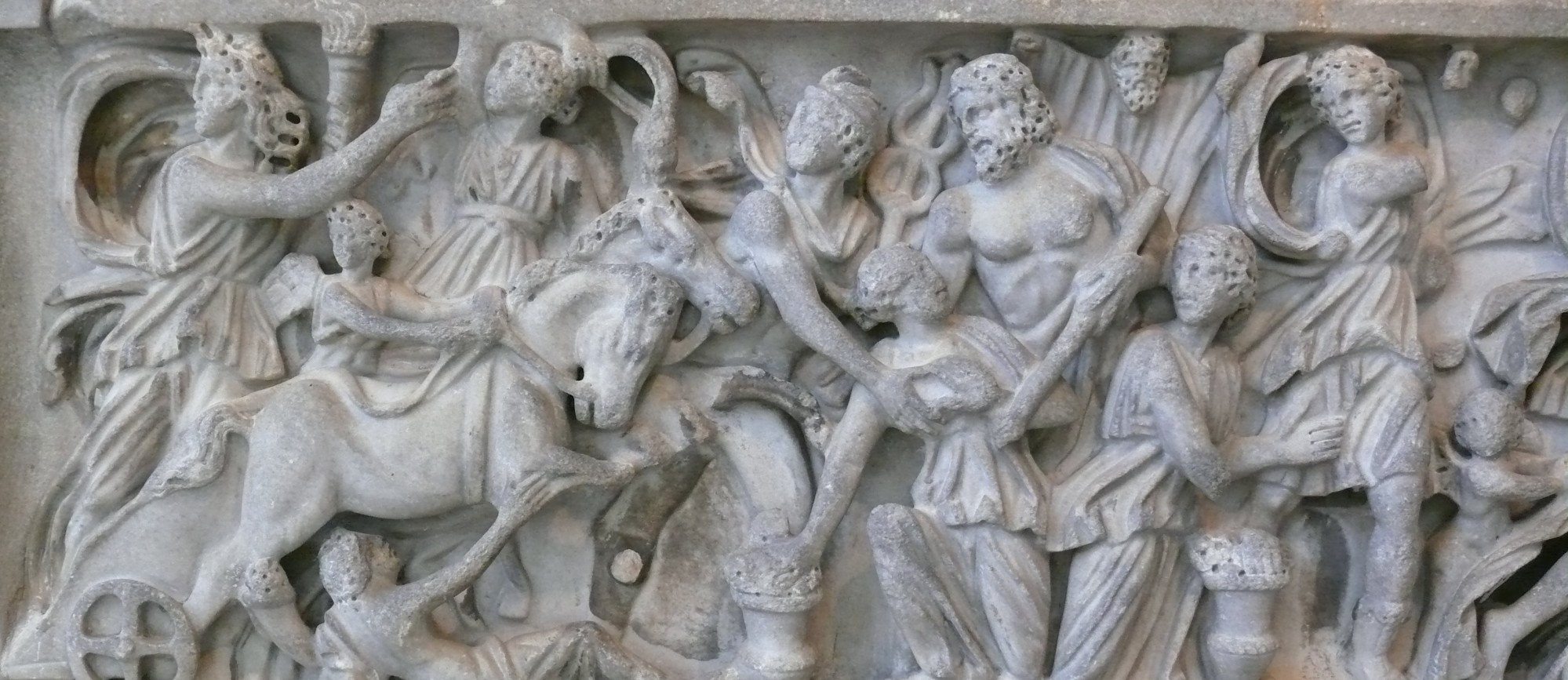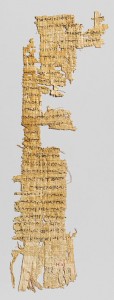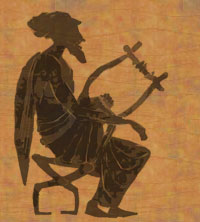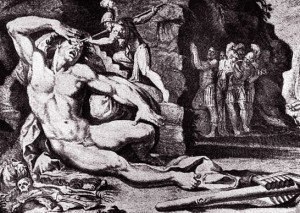The Odyssey, the epic poem created by Homer. Arguably one of the pinnacles of Greek myth. Also arguably one of the most tedious reading assignments in high school. The epic tale of our hero Odysseus and the trials he faced on his return home after the Trojan War. While the version of the Odyssey we know today was written down by Homer sometime in the 7th or 8th century, historians believe that the stories of the Odyssey began being told orally long before writing down of such stories took place. The Odyssey has its roots in the tradition of oral storytelling, leading us today to believe there are countless versions of the Odyssey that didn’t get written down, leaving them lost forever in history. The concept of what these lost stories could have held comes alive in the book The Lost Books of the Odyssey by Zachary Mason.
Mason calls upon images and stories we all recognize from the Odyssey, the cyclops, the sirens, Odysseus’s slaying of the suitors and faithful Penelope, and warps them. Playing with our expectations of these stories, Mason creates amazing new worlds with the tiniest twist in the common plots we know, even creating completely new stories to entice readers to imagine, what if? Christopher Logue also “reinterprets” ancient myths, his one work Patrocleia is particularly interesting, and you can check out a comparision of it to the original here.
Mason sets up the books as if he has translated lost fragments, re-discovered pieces of other version of the Odyssey. They range from completley new tales to the stories we aready know from the perspectives of other characters. There are 44 of these “fragments” but I will be focusing on 2 of these fragments and how they compare to the story we know.
Fragment 18, titled The Illiad of Odysseus, starts off with Odysseus’s point of view, a view we are unable to achieve in the Odyssey. We begin with Odysseus recounting his childhood training briefly, revealing that he was not one born for battle, nor did he want to partake in it. With his real desire to be a Bard, his father condemned this dream and told him he was a man born to live the stories, not sing them. Continuing on he recounts of when Agamemnon came to recruit him for the war, and the fear Odysseus felt. He fakes illness and his superiors interpret his false seizure as a sign that he is a favorite of a god, which Odysseus goes along with, saying Athena talks to him on occasion. Arriving at Troy he hated the war and the barbaric way the soldiers acted, but he stays because leaving would mean being disowned by his father, losing his rite to rule his land. After talking of his thoughts on battle and of Achilles, the story finally has a definitive difference in the plot from the Odyssey. I say definitive because until this point who is to say none of this is true?
Odysseus is known for his cunning wit, along with his ability to concoct stories and plans within seconds. The Odyssey is Odysseus telling every one of his heroics and thoughts. As mentioned before, Odysseus would not leave the war because he had too much pride. He would have rather “died than come down in the world”. Odysseus’s pride is the center of many choices he makes throughout the Odyssey, to say that it would also be the reason he would lie and pretend that he’s a great, head-strong warrior isn’t a far leap.
Going back to the story, in the fragment Odysseus sneaks into Troy, but this time not to talk to Helen, but to bribe one of her maids to kill her and bring him back her scalp, in hopes that the death of Helen would persuade Menelaus and Agamemnon to end the war. The Greeks begin to feud against each other, one half wanting to go home and the other wanting to stay and finish the war. During this argument the Trojans launch a full-out attack, in this moment of oppertunity Odysseus runs away from the battle, gathers a disguise and slips away. After slipping away Odysseus becomes a Bard, what he’s always wanted to do with his life, and starts spinning tales of his own bravery and cunning in the war, making himself into an ageless hero. After ten years Odysseus decides to return home, creating the tales of what had happened to him that prevented him from returning for 10 years.
This new perspective of taking the journey along with Odysseus opens up a new world of interpretations of his character. When reading the Odyssey what do you really know about Odysseus and his adventures that you don’t hear from him? Or from Bards recounting stories from the war? Odysseus is known for his ability to lie and plan on the spot, so what could stop him from creating these stories? This idea completely destroys the figure of Odysseus that is created in the Odyssey. He goes from this brave warrior, whose misfortunes prevent him from returning home to his beloved wife and land. Instead we have a scared, common man whose only self-proclaimed abilities are his finesse with the bow and rhetorical skills. A man who decided to watch his allies die and escape the war, living in hiding and falsifying stories of himself until he decided he “was done”, and wanted to return home to live a simple, normal life. This telling makes him more of a prideful, common man than a brave hero, loved by gods.
In fragment 26, Blindness, Mason further pushes the true character of Odysseus. This story is told through the perspective of Polyphemus, as he recounts his encounter with Odysseus and how it affected him. Through the eyes of the Polyphemus, he comes home one day to find his home full of intruders, taking his things and eating his food. He attempts to scare them away, but being as he is unbearable strong he accidently kills one of the crew members. Ashamed of this mistake he listens to the captain, Odysseus, and takes the wine he offers him. The wine putting him to sleep, Polyphemus wakes up blinded, and in rage flails trying to strike at Odysseus and his crew. In his new blindness Polyphemus spent a lot of time thinking about “Nobody”, the name Odysseus gave, and creating stories about him and his crew. It ends with him telling the stories to the farmers who no longer fear him as he is blind, and he speaks tales of this traveler, finding misfortune after misfortune trying to get home.
This ending with Polyphemus as a storyteller telling the stories of the trials of this hero can be interpreted that the cyclops is Homer. From his small interaction he creates his character as a cowardly warrior who has a brilliant mind, and builds these trials he suffers through, but never dies since death would be too easy of an escape. This fragment is also another way to think about Odysseus and his story telling. Even if he had faced trials on his way home, how accurate were his stories? As the only survivor Odysseus could say whatever he wanted. Why would anyone tell the story about how they invaded a peaceful creature’s home, stole their food, and blinded them when they could say they sleighed the mighty beast that attacked and killed his men? Another article that you can read here also plays with the idea that Odysseus is not such a cunning hero and is self-absorbed and reliant on the gods.
Both of these re-written pieces of the Odyssey open up interpretation to the whole book. Was Odysseus a brave hero in the Trojan War who fought for 10 years after to return home to his wife and son? Or was he just some scared man who lied so much throughout the years that the stories of his “heroics” caught on.




